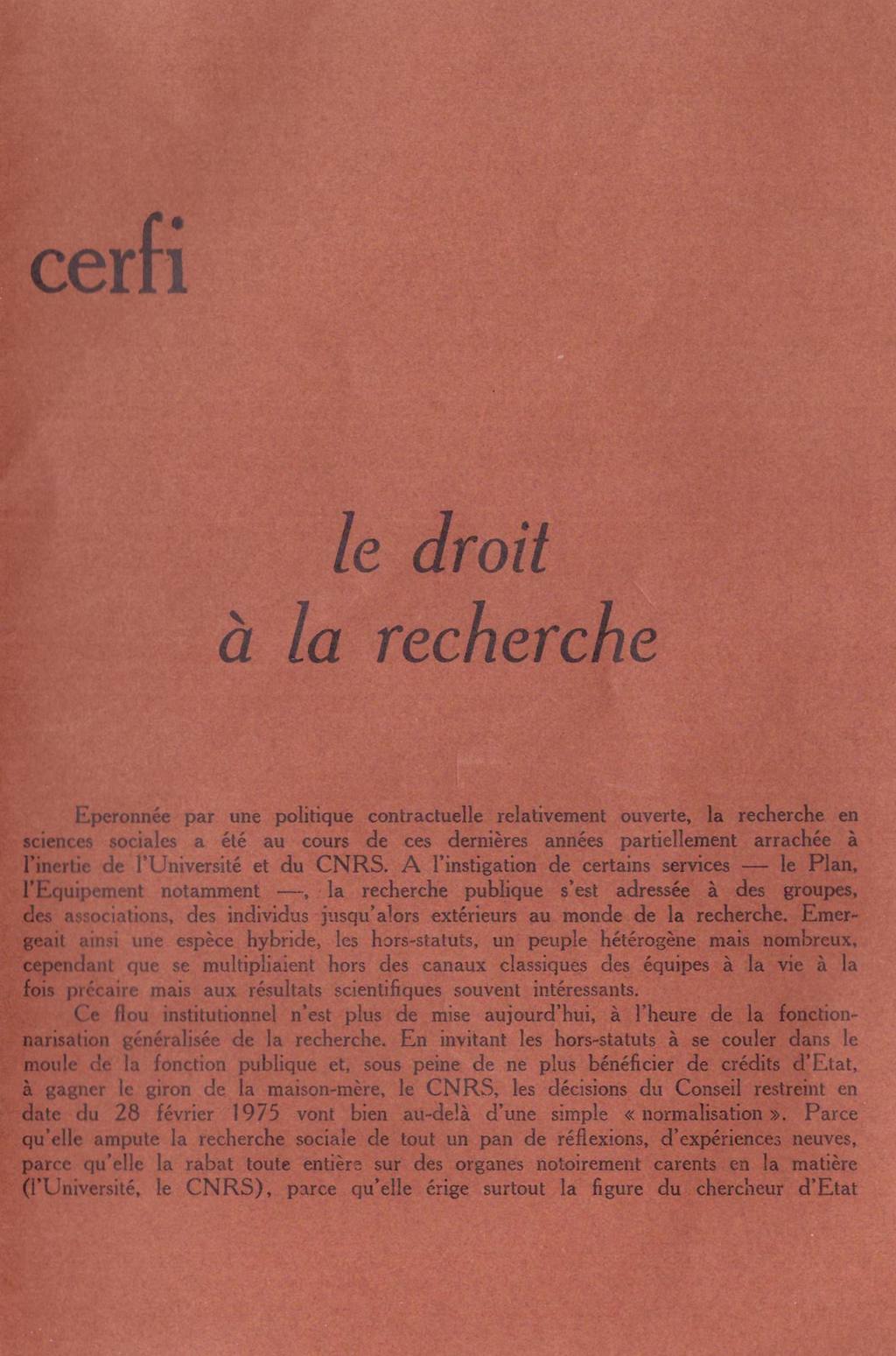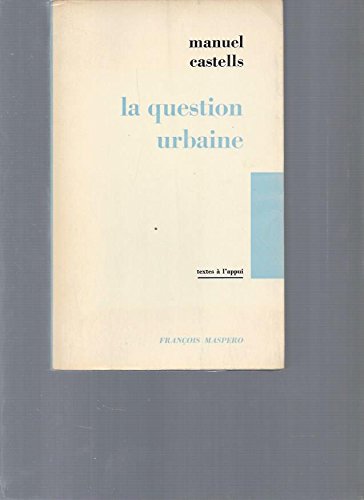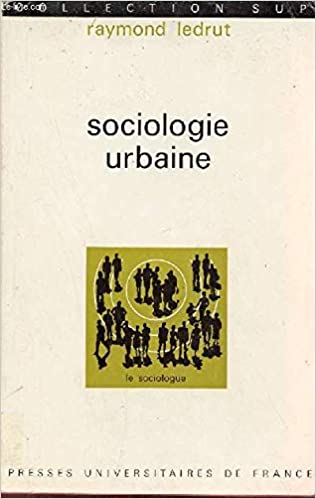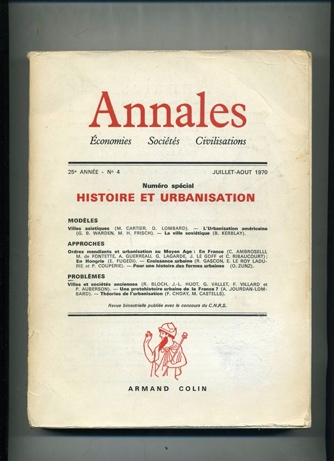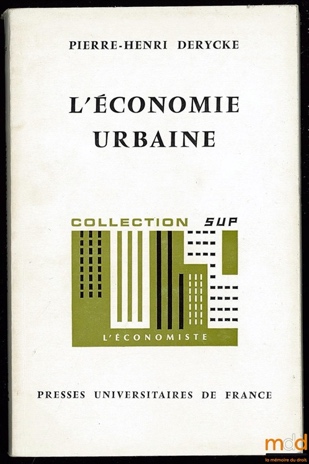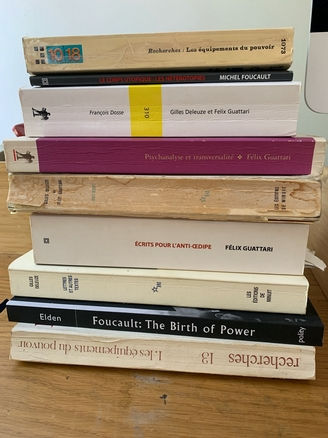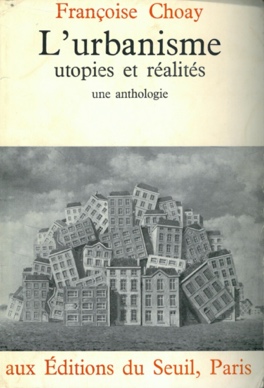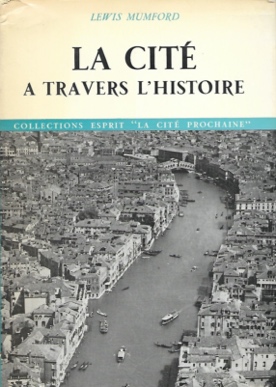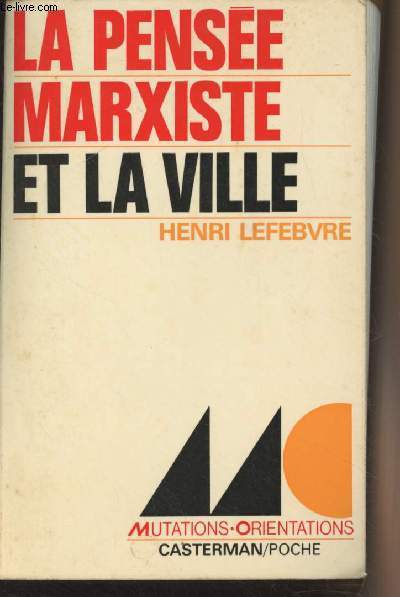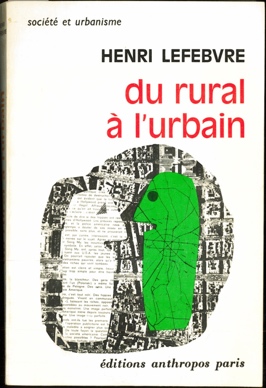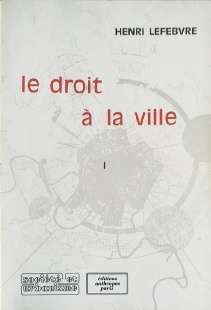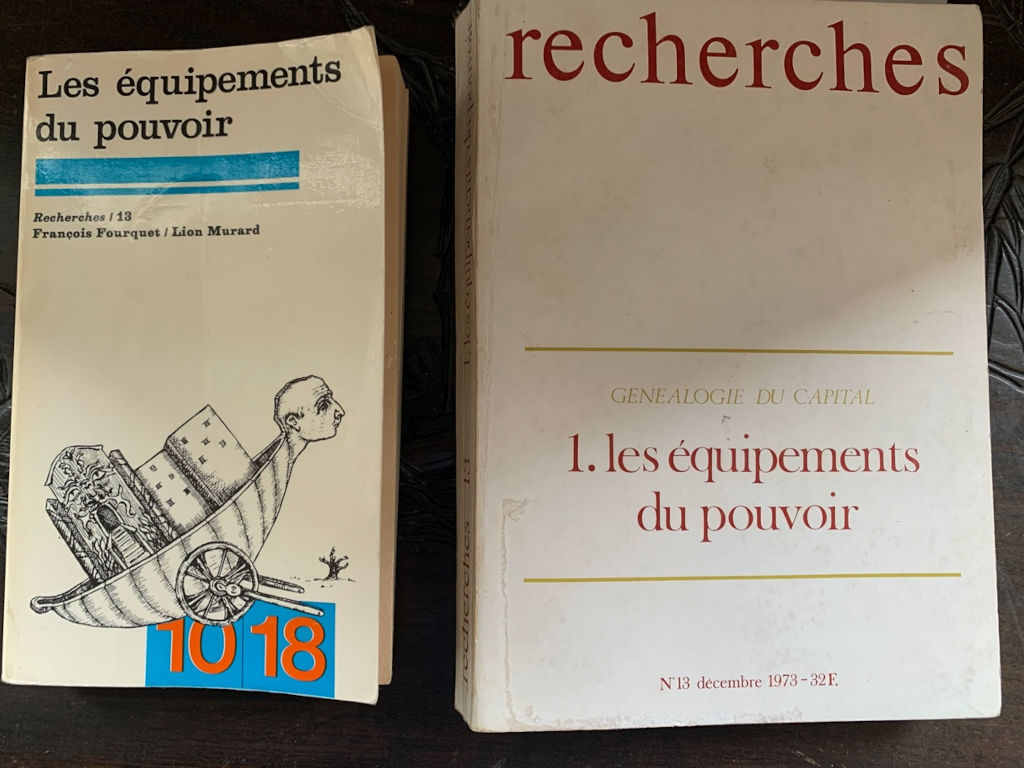Copying Stuart Elden’s blog style, but this is the pile of books
on my table:
So, I read Chapter 1 – ‘La ville-ordinateur’, the ‘intervention
militante’ from Anne (Querrien), and the discussion with
François (Fourquet), Félix (Guattari), and
Michel (Foucault). These materials appear to have been
written in 1971-1972. So if this can count as a first series it shows
the strong influence of the theses being developed by
Deleuze-Guattari for Anti-Oedipus (henceforth
AO) [see correspondence in Deleuze, Lettres et autres textes;
the account of Deleuze and Guattari ‘s encounter in Dosse, and the
transcriptions of Deleuze’s lectures at Vincennes on
Webdeleuze,
and in particular the third part ‘Sauvage, barbares, civilisés’.
The starting point for Chapter 1 is the anthology of writings on
urbanism collected by Françoise Choay (1965). If the picture
that emerges from the latter is the opposing tendencies of the
‘functionalist-rational’ city as developed by Le Corbusier in the
‘Charter of Athens’ and the ‘culturalist’ tendency embodied by
Lewis Mumford and Henri Lefebvre, among others [see images below],
the CERFI team seek to displace this by addressing its epistemological
underpinning (‘le socle épistemologique’ – which, in inverted commas,
is plausibly a reference to Foucault’s Les Mots et les choses, e.g.
p. 233), a framework which assumes the pre-existence of a Subject;
CERFI’s postulation is that the city should be understood rather as a
means (moyen) of production which produces a Subject as Consumer
(consommation). Deleuze & Guattarian thematics are very evident
here, with the notion of the city as a ‘coding’ or ‘cutting’
(coupure, decoupage) of flows (flux) or energy. Certain terms
(despote, territoire, organs, capitale, corps inerte) relate
directly to the concerns of Deleuze and Guattari in Part 3 of AO.
There is also a strong emphasis on the idea of the machine and
information, whence the title, ‘ville-ordinateur’ – the city as a
coding of semiotic (informational) flows; the influence of cybernetics
is in the background. There is also a passing reference to the city as
a self-producing organism like a cell via Jacques Monod.
Anne Querrien’s intervention discusses the irony of the investment in
‘theoretical’ activity versus ‘militant’ activity, given the turn of
the ‘theorists’ (Deleuze, Foucault) towards militant activity
(presumably the Groupe d’Information sur les Prisons), and Guattari’s
absence due to work ‘en chambre’ on AO with Deleuze. A fault-line
appears to emerge here between those who think of the city as
‘antiproduction’ (Hervé Maury), with production on the side of the
militant activity seemingly aligned with ‘collective equipment’; Anne
mentions that François Fourquet, Lion Murard and
Marie-Thérèse Vernet-Straggiotti have been attending Deleuze’s
lectures at Vincennes and have ‘pirate’ typescripts of it. These
presumably enable a clearer situation and a more subtle dynamic
between production and anti-production – the city codes or stops the
flow of energy from the ‘social machine’, aligned with ‘collective
equipment’, but it is only in the despotic order, itself aligned with
the ‘Asiatic mode of production’ that this can be seen as complete
anti-production (or ‘body without organs’). These thematics are
developed in the discussion between Guattari and Fourquet. Anne adds
that for her part she thinks genealogy has more to do with the ideas
developed by Foucault in his work on madness and the clinic, and goes
back to her notes on Foucault’s Archaeologie du savoir.
The Fourquet-Guattari discussion revolves around the issue of whether
the city is an instance of anti-production (as above). Fourquet seems
skeptical about the idea of collective equipment as a productive flux,
seeing it only in terms of coding and accounting. Guattari holds
out hope in the capitalist era for the uncontrollable energies
emerging from the social machine, escaping from the control of the
city as ‘body without organs’. There is an interesting thematics of
writing and inscription, straight out of AO.
Various bibliographic researches around this identify a ‘first
synthesis’ of the report on collective equipment (Fontenay-sous-bois,
CERFI, 1973), which Stuart Elden has in his possession (as reported on
his Progressive Geographies
blog).
The authors include the usual suspects (Fourquet, Maury, Mozère,
Querrien, Murart (sic.) but also Christian Hennion (see
later)). Elden’s account of the first Foucault dialogue in Foucault:
The Birth of
Power (Polity,
2017), pp. 168-77, is instructive, but understandably slanted towards
Foucault’s input. Elden usefully situates Foucault’s intervention in
the context of the Collège cours on Théories et institutions pénales
and La Société punitive and the shift away from the Althusserian
insistence on ‘appareils d’Etat’, and the interesting insistence on
the detail of e.g. roads and mills.
Other bibliographic discoveries, not all of them essential, include
the following:
Kenny Cupers, The Social Project: Housing Postwar
France
(MIT, 2014), which mentions CERFI urban projects briefly and
approaches from the perspective or urban planning and new towns.
Christian Tutin, ‘Ville et
reproduction’,
Cahiers de C3E, 78 (sept 1988) proposes the city as space of the
reproduction of capital and has much overlap though not a lot of
reference to CERFI; Castells is a key reference.
Edmond Préteceille, ‘Équipements collectifs, sciences sociales et
planification’ in Les Annales de la recherche urbaine, N°20, 1983.
Décentralisation et la recherche locale? pp. 31-52. Passes over CERFI
projects on collective equipment but the real interest is elsewhere.
Potentially useful bibliographic references.
The Foucault dialogues in Recherches 13, in French in Dits et
Ecrits I, are translated in Foucault Live: Collected Interviews
1964-1981, ed Sylvère Lotringer (Semiotexte, 1996), pp. 105-112.
Trans. by Lysa Hochroth.
François Fourquet, ‘L’accumulation du pouvoir, ou le désir d’État:
CERFI, 1970-1981’, Recherches, No.
46,
- This is a recapitulative history of CERFI which needs to be read
in parallel to Issue 13 and its related publications.
Site, No 2,
2002, http://www.sitemagazine.net/issues/2_2002;
online architecture-theory periodical which includes ‘CERFI: and
Introduction’; Anne Querrien, ‘Four Remarks on CERFI; François
Fourquet, ‘History of CERFI’; Sven-Olov Wallenstein, ‘CERFI, Desire,
And The Gene-alogy Of Public Facilities’; ‘Schizoanalysis And City’ By
Helena Mattsson; ‘The Urban Mental Hospital And The State of Research’
By Meike Schalk; ‘Nietzsche, Foucault, And Genealogy’ By Brian Manning
Delaney; ‘The First Discussions, First Tentative Efforts: Is The City
A Force Of Production, Or A Force Of Anti-production? Despite Its
Sharpness, A Fabulous Discussion Does Not Succeed In Penetrating The
Enigma Of Capital (Excerpt from discussions 1972–73).
Liane Mozère, ‘Foucault et le CERFI : instantanés et
actualité’, Le portique,
No 13-14, 2002 (see notes on this below).
From Elden’s blog, a link to a CERFI related
document
ostensibly from Foucault which looks like a report on a funded project
on collective equipment ‘Emergence des equipments collectifs’ (note
difference from ‘Genealogy’) with a presentation by Philippe
Chevalier, in the online review Ici et ailleurs. Chevalier’s
presentation suggests that it includes echoes of Surveiller et
punir. He identifies that it is a CERFI contract with the ‘Service
des affaires économiques et internationales (SAEI) du Ministère de
l’équipement’ dated June 1973. ‘Le nom attaché au contrat était alors
Gilles Deleuze pour le CERFI’. He situates this project as the same as
the ‘Genealogy’ one, ‘dans le cadre d’un contrat engageant le CERFI,
la Délégation générale à la recherche scientifique et technique
(DGRST) et le SAEI. Ce travail se composait d’une première partie
dédiée à l’école primaire et d’une seconde aux équipements sanitaires
(avec elle-même trois volets : l’institution hospitalière au XVIIIe
siècle, les équipements psychiatriques au XIXe et l’histoire de la
psychiatrie de secteur). […] ‘D’une partie de cette recherche, il
sera rendu compte dans l’ouvrage collectif Les machines à
guérir. Aux origines de l’hôpital moderne (Paris, Institut de
l’environnement, 1976)’.
Chevalier adds some useful refs. to Daniel Defert, « Hétérotopie :
tribulation d’un concept entre Venise, Berlin et Los Angeles » in
Michel Foucault, Le corps utopique, les hétérotopies, Paris,
Nouvelles éditions lignes, 2009, p. 49. I happen to have this on my
shelf and indeed Defert does give an interesting account of the CERFI
projects and others in the context of Foucault’s interactions with
architects. Defert says that Foucault hung out with Françoise Choay in
the 60s.
The manuscript is typed out on the site and includes valuable
footnotes, and two responses, including this one, from ‘Scala’, which
is interesting:
‘Afin de compléter votre information, le CERFI a conjointement financé
deux programmes de recherche cette année-là (1972-73), l’un sous la
direction de Michel Foucault (les équipements du pouvoir) et l’autre
sous celle de Gilles Deleuze (les machines de guerre). Chaque
équipe était constituée de trois jeunes chercheurs. Les travaux de
recherche de l’équipe dirigée par Gilles Deleuze n’ont donné lieu à
aucune publication, ils ont sans doute donné matière à l’élaboration
par Deleuze & Guattari de leur concept de machine de guerre dans* 1000
plateaux*.’
‘Scala’ could be ‘André
Scala’.),
who was a student/friend of Deleuze and attended the Vincennes
lectures. He was Foucault’s last interviewer, along with Gilles
Barbadette, cf. – ‘Le Retour de la morale’ in Les Nouvelles
littéraires, 1984. Dits et ecrits 354. But I can’t find any
evidence of a CERFI contract on war-machines. In that chapter of
Mille plateaux D & G do refer, however, to Anne Querrien’s book
Devenir fonctionnaire ou le travail de l’État, published by CERFI,
and ‘unpublished studies by Anne Querrien’.
Other references on this site, which beg the question of what and
where these ‘Copédith’ publications are. The ‘Imprimerie Copédith’,
whose address was 7 Rue des Ardennes in the 19th, seems to have been
the printers for a range of 1970s periodicals and short form texts,
including psychoanalytic journals Ornicar? and le Coq Héron.
Anne Querrien, Généalogie des équipements collectifs, Les équipements
de normalisation, L’école primaire, Paris, CERFI, Impr. Copédith,
1975
Michel Foucault (dir.), Généalogie des équipements de normalisation,
Les équipements sanitaires, Paris, CERFI, Impr. Copédith, 1976.
François Fourquet, Histoire des services collectifs dans la
comptabilité nationale, Paris, CERFI, Impr. Copédith, 1976.
Susana says that Godofredo [Pereira] can tell us about the CERFI
contracts 😊
The Chevalier website includes a reference to: Taga Shigeru, ‘Foucault
et Guattari au croisement de la théorie du micro-pouvoir et de la
psychothérapie institutionnelle’, dans Hervé Oulc’hen (dir.), Usages
de Foucault, Paris, Presses Universitaires de France, 2014, p.
99-107. See here:
https://www.cairn.info/usages-de-foucault--9782130621102.htm. The
Shigeru article can be bought online. He is a Professor at Kyoto
University. Author of Jean Oury Rencontre avec le Japon, 2005.
Notes on Liane Mozère article: “Foucault et le CERFI : instantanés et
actualité”, *Le portique*, No 13-14, 2002
Liane Mozère starts with the emergence of CERFI in 1965 with young
people excluded from UEC – Union des étudiants communistes – who met
Guattari. [Reference to: Liane [Mozère], Le Printemps des crèches.
Histoire et analyse d’un mouvement, L’Harmattan, 1992, which tallies
with other mentions of the ‘groupe crèche’ in R13]. Description of
CERFI as: ‘cette bande liée autant par des convictions que par des
affects’. Militants one day and the next attending Lacan’s seminar on
Tuesday. ‘Ainsi, évoquer la figure de Michel Foucault qui a assuré la
direction scientifique des premiers travaux du Centre d’Étude, de
Recherche et de Formation Institutionnelles (CERFI), groupe de
recherche créé à l’initiative de Guattari en 1967, qui associe ces
anciens militants, impose d’adopter une posture susceptible
d’articuler apports théoriques – la démarche généalogique – et
enjeux (micro)politiques.’ Foucault and Deleuze were used as names or
guarantors for the CERFI projects funded by the Ministère de
l’Equipment. Mozère suggests that the context can allow theoretical
issues e.g. genealogy – to be linked to micropolitical issues, which
is exactly the focus of our project The Pragmatic Genealogy of
Concepts, I think. Genealogy, moreover, is a key term here; arising
from Foucault’s Archèologie du savoir and ‘Nietzsche, Génealogie,
Histoire’, often referred to as the Hommage à Hyppolite, since
Hyppolite died in 1968. Foucault’s essay appeared in Hommage à Jean
Hyppolite, PUF, 1971. See more on genealogy later.
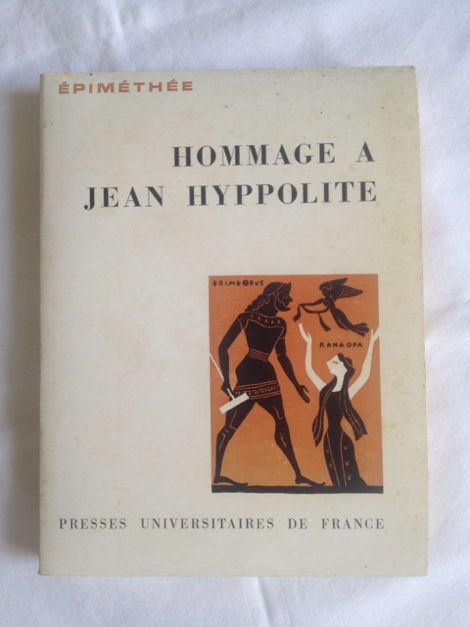
Liane continues: Cerfi allowed salaries via ‘la recherche
contractuelle’, and without making a difference between ‘experts’ and
others. Liane’s note is important: ‘Ce financement provient du Budget
civil de recherche et développement (BCRD) attribué à des Services de
recherche des différents Ministères qui contractent avec des
chercheurs ou des collectifs de recherche. Le plus souvent sous la
forme de contrats passés de gré à gré, le financement de la recherche
sera transformé en profondeur du fait d’une réduction drastique des
crédits du BCRD sous le gouvernement de Raymond Barre et du fait de
l’instauration d’un système d’appels d’offre avec constitution de
Comités scientifiques auxquels participeront dans la plupart des cas
des membres des différentes instances académiques (CNRS, Universités).
Si un tel principe n’est pas illégitime, il n’en demeure pas moins
qu’il a, de fait, placé les collectifs de « hors statut » en position
précaire, leurs demandes de financement ne pouvant pas faire
l’économie des dépenses de salaires que les laboratoires n’imputaient
pas dans leurs budgets prévisionnels. Un nombre considérable d’équipes
« hors-statut », comme le CERFI ont ainsi disparu de la scène de la
recherche sociologique alors qu’elles avaient fait la preuve depuis
plus de dix ans de la pertinence et de la valeur de leur travail.
(François [Fourquet], L’accumulation du pouvoir ou le désir
d’État, Recherches n° 46, 1982).’
The BCRD – Budget civil de recherche et développement – allocated to
research depts of different Ministries – established contracts. But
the BCRD budget was drastically cut under the govt. of Raymond Barre
(Prime Minister 1976-1981). After that research funding was allocated
by scientific committees usually involving universities & CNRS). This
placed research collectives ‘hors status’, and budgets could not cope
with salaries. See Fourquet’s article in the last issue of
Recherches. This instance relates to the ‘Droit à la recherche’
publication, and Mozère’s point is of crucial importance for the
research strategy aspect of the project; is research funding now
moving back, with its emphasis on co-production, to a situation where
non-academic researchers can be paid salaries, or is this just a kind
of figleaf?
‘C’est dans un tel contexte que Michel Foucault, sollicité par Gilles
Deleuze et Félix Guattari, accepte de se porter garant du troisième
contrat de recherche d’importance sur la Généalogie des équipements
collectifs pour le compte du Ministère de
l’Équipement 5
et en général des activités du CERFI.’
[Foucault was thus the guarantor of third research contract, on the
Genealogy of Collective Equipment ; what were the other two?; see
above, but Liane also answers this in the note:
‘Deux autres contrats de recherches avaient précédé le projet dit
Généalogie : un avec le Ministère de la Coopération sur un projet
d’éducation télévisuelle en Côte d’Ivoire qui devait permettre le
développement de l’enseignement en sauvegardant les langues
vernaculaires (Recherches n° 15, « La coopération en pratique »,
1974) et l’autre sur la programmation architecturale d’un équipement
psychiatrique (*Recherches *n° 6, « Programmation, architecture et
psychiatrie », 1967).’
So the two other CERFI ‘contracted research’ projects up to 1973 were
:
-
Televisual education in the Ivory Coast. The main contact here was
Janine Christiany, who went to the Ivory Coast with Liane M
and Hervé Maury and François Fourquet. See Morford and ‘La
co-opération en pratique’ in Recherches 15. This needs to be
read. It is the second ‘Programmation’ issue.
-
Architectural programming of a psychiatric equipment.
Recherches 6. This was the first issue of the journal which
mentions CERFI as an ‘official’ organisation. Two doctors were at
that point the ‘guarantors’ – Guy Ferrand and Jean-Paul Roubier.
Need to read this too. It was this issue from 1967 which gained
the attn. of Michel Conan, according to Querrien and Dosse.
Foucault attended CERFI meetings. [when? Probably around 1971, when
the CERFI ‘local’ would have been probably 103 BVD Beaumarchais,
though need to check]. Liane says that Foucault’s work at this time
entered into resonance with Guattari’s work on the ‘conceptualisation’
of the analysis of capitalism Guattari had been developing for some
years. This seems exaggerated to me. Secondly, both Foucault and
Guattari were thinking about new forms of political engagement. Liane
refers to the GIP (Groupe d’information sur les prisons),
established by Foucault in Feb 1971, and involving Pierre Vidal-Naquet
and Jean-Marie Domenach, Daniel Defert (linked to the Gauche
proletairienne movement), Maurice Clavel, eventually Deleuze….
Liane adds in a note that there were a number of ‘croisements’ btw.
CERFI and the GIP, Ariane Cotlenko and Claude Rouot, for example,
moved across from the GIP to CERFI, though the ‘Claude’ referred to in
R13 could also be Claude Harmelle.
On the question of how these militant organisations gave ‘voice’ to
aspirations and desires occulted up to then, Liane refers to
Alfred Hirschman, Exit, Voice and Loyalty, publ. 1970 in the US.
The Nietzsche/Hegel faceoff comes into play again:
‘La démarche généalogique que Foucault emprunte à Nietzsche permet
d’opérer une rupture décisive par rapport à Hegel en n’attribuant pas
la naissance d’une chose, d’un corps ou d’une institution à son
utilité. C’est au contraire par une succession de processus de
subjugation que cette chose, cette institution ou ce corps prennent
forme et apparaissent. Et Foucault montre que ce qu’il convient
d’éclairer c’est le coup de force qui les a engendrés, coup de force
qui casse tous les systèmes d’usage prévalant jusque-là.’
Nietzsche versus Hegel. This is the perspective Foucault develops in
‘Nietzsche, Genealogy, History’. But it’s also worth pointing out
that Georges Bataille, among others, is also a key figure in the
Hegel/Nietzsche dynamic, having attended Alexander Kojève’s lectures
on Hegel at the Ecole pratique des hautes études in the 1930s, and
having attempted to ‘rescue’ Nietzsche from the fascist interpretation
in an issue of Acéphale. See also Bataille’s Sur Nietzsche, 1945,
and Mémorandum. Recall that Bataille’s Œuvres complètes had been
published in 1970, with a preface from Foucault. See also Hollier,
Denis: « De l'au-delà de Hegel à l'absence de Nietzsche », in
Philippe Sollers (éd.), Bataille. Colloque de Cerisy, Paris 1973,
75–105.
Against this background the ‘genealogy’ group of CERFI (Fourquet,
Murard, Querrien, Lévy, Vernet-Straggiotti): ‘va chercher à montrer
comment un équipement particulier n’est d’aucune utilité en dehors de
sa fonction d’instrument de codage, de confinement, de limitation et
d’éradication de l’énergie sociale libre’. I’d say that the terms
here, e.g. ‘codage’ sound much more like those of Deleuze-Guattari,
but that the displacement of ‘utility’ does key into the Second
Treatise of Nietzsche’s Genealogie de la morale (see further on, and
Nietzsche dossier). It’s a movement away from the Hegelian ‘rational’
emphasis on the development of society according to desires (needs)
and utility, and towards Nietzsche’s ‘will to power’ and subjugation.
Liane then says her interest is in the way Guattari’s work on
‘subjugated groups’ and ‘group subjects’ was articulated with
Foucault’s. Refers ‘group subject’ to Sartre. Evokes the encounter of
Deleuze and Guattari, and says that: ‘On pourrait, par exemple, dire
qu’au CERFI l’apport de Foucault a été nourri et fécondé par les
concepts créés par Deleuze et Guattari qui ont permis de ménager un
passage de témoin.’ [which allowed the arrangement of a passing of
the baton?].
Liane then refers slightly obscurely to an ‘invitation’ from
Fernand Braudel (see dossier on historians): ‘Lorsque
Fernand Braudel invite, dans les années 1970, M. Foucault, G. Deleuze,
F. Guattari, P. Bourdieu, M. Godelier et
quelques « jeunes » du CERFI, Godelier est laissé seul par Bourdieu
pour défendre la position structuraliste face à un trio de voix, à la
fois proches et distinctes’.
This might relate to a debate involving Foucault and historians which
took place slightly after the publication of Surveiller et punir of
which there is an account in L'impossible prison: recherches sur le
système pénitentiaire au XIXe siècle / réunies par Michelle Perrot;
débat avec Michel Foucault (Seuil, 1980). See review by Michael
Ignatieff.
But no, actually, this is not it. The Dits et ecrits say that in
1976 the historian Michelle Perrot gave a lecture to the general
meeting of the Society for the history of the revolution of 1848, and
series of articles in the Annales historiques de la revolution
francaise followed, to which Foucault responded. On this issue (OK,
so this is a digression), this
article
is interesting and potentially useful. But I can’t find the
‘invitation’ to which Liane refers.
Liane points to a reference to Foucault in ‘3 Group Problems’ (preface
to Psychoanalysis and Transversality) to underline the ‘proximity’
btw, Foucault and Guattari. There was thus continuity btw the
micropolitics of CERFI and that elaborated by Guattari at La Borde and
outside it. The common point is the reaction to the ‘intolerable’
rather than the ‘universalist’ position of the intellectual. Liane
cites Deleuze’s Foucault at this point, to underline the common
insistence on micropolitics. She goes on to evoke the FHAR
(mentioning that it emerged out of the Vive la revolution movement)
and the MLF. Mentions that some members of FHAR came to CERFI seeing
it as hospitable. Liane mentions some of the names involved (of the
group involved in the ‘3 milliards de pervers’ issue):
Catherine Bernheim, Gilles Châtelet, Michel Cressole,
Fanny Deleuze, Gilles Deleuze, Laurent Dispot, Michel Foucault, Jean
Genet, Félix Guattari, Daniel Guérin, Christian Hennion, Guy
Hocquenghem, Georges Lapassade, Marie-France, Anne Querrien, Christian
Revon, Jean-Paul Sartre. Liane then says that (homo)sexuality became
the ‘pierre angulaire du rapport à soi’. The rest of her article is of
more theoretical interest.
Uncategorised notes from web-searches
List of projects financed by the Ministère de l’Equipment, 1974-1982
-
1974-76: CERFI : « Recherche exploratoire sur la signification
sociale de l'accident ».
-
1977-78 CERFI, Convention n° 75 000 220 022 575 01 : « La
représentation sociale de l'accident, enjeux de pouvoir ».
-
1979-80 CERFI, Convention n° 76 00 060 225 75 01 : « Étude
exploratoire : la mobilité généralisée contribue-t-elle à la
constitution de nouvelles sédentarités ? »
-
1980-81 CERFI, Aide à la recherche n° 77 7 1768 : « Représentation
sociale de l'automobile et genèse de sa crise - 1ère partie ».
-
1981-82: CERFI, Aide à la recherche n° 77 7 1768 : « Représentation
sociale de l'automobile et genèse de sa crise - 2e partie ».
- Also – this
report
- a research report on new towns in the Isère? Quite a lot on CERFI,
but mostly related to the ‘programmation’ project it seems.
Names for the Ministry:
-
Ministère de l'Équipement et du Logement from 7 avril 1967 to 5
juillet 1972
-
Ministère de l'Aménagement du territoire, de l'Équipement et des
Transports from 1er mars 1973 to 27 mai 1974
-
Ministère de l'Équipement et de l'Aménagement du territoire from
30 mars 1977 to 31 mars 1978
-
Ministère de l'Urbanisme et du Logement from 23 mai 1981 to 17
juillet 1982
Notes on Chapter Two – La ville-métaphore
Drafted in November 1972, i.e. after publication of Anti-Oedipe.
Right from the start the authors mark their encounter with
Fernand Braudel. Braudel is among the foremost representatives of
the Annales school of historians, and based at the 6th section of
the EPHE (Ecole pratique des hautes etudes), which he directed after
the death of Lucien Febvre in 1956. There is more to say on this
evidently (see dossier), but a potential tension between Braudel’s
insistence of ‘longue durée’ and Foucault’s on discontinuities,
ruptures. The works by Braudel in the ‘ouvrages cités’ are: La
Méditerranée et le monde méditerranéen à l'époque de Philippe II, of
which the first edition was 1949, with a reprint 1966, Civilisation
matérielle et capitalisme, 1967, Ecrits sur l’histoire, 1969, and
‘La Catalogne, plus l’Espagne’, in Annales, March-April 1968. The
first two of these are major works, long in the gestation. The first
reference of Chapter 2 is to Civilisation matérielle, but it is
worth underlining that the 1967 publication to which CERFI refer is
only the first volume of a work which would have multiple further
vols. The 1967 volume is on ‘Les structures du quotidien’ and to its
8th (and last) chapter on ‘Towns and Cities’. The footnote which tells
of the encounter with Braudel cites the first sentence of this chapter
which in Sian Reynolds’ translation is ‘Towns are like electric
transformers. They increase tension, accelerate the rhythm of exchange
and constantly recharge human life’ (p. 479).
Summarising the first chapter, CERFI say that they had started with a
challenge to the functionalist/culturalist alternative (of F. Choay’s
anthology) and proposed the city or town as a means of production or
an ‘informatic machine’ thus as ‘collective equipment’. They highlight
this a shift from the topic of the city to that of collective
equipment. They say this entailed conflating one with the other, and
not acknowledging the specificity of cities, which they say they will
come back to. So the city is a ‘screen-notion’ (i.e one that hides
another) behind which what is at stake is capitalism and territory,
State collective equipment. It is these latter concepts which are
their desired focus – in other words they want to escape from the
constraints or urbanism and think the material very much along the
same lines as [[ Deleuze and Guattari ]] in AO, Part 3 – ‘Sauvages,
barbares, civilisés’ – territory, State, capital. Collective
equipment, on the other hand, is not a term with much currency in AO.
Interesting to think about the prominence of the concern with the
State here. Of course CERFI are undertaking research for the
State, but this is also a prominent topos e.g. in Foucault’s first
three courses at the Collège, in AO, and in e.g. Pierre Clastres, La
Socièté contre l’Etat. Althusser’s theses on State apparatuses,
repressive and ideological, is a significant anchor point for a number
of discourses in 1970-1973.
It is also interesting that the beginning of Chapter Two involves a
kind of auto-critique on the part of CERFI of their own conceptual
moves in Chapter One; the concept of the city has dissolved itself,
and they see it now functioning as a displacement and condensation
(classic Freudian mechanisms of the unconscious or more specifically
of the dreamwork), standing in for collective equipment, and
collecting to itself all sorts of heterogeneous material. A
psychoanalytic approach is adopted here which suggests that the
discourse on the city (e.g. Lewis Mumford) is a ‘screen-discourse’
which hides a lack of material reality and historicity. In Braudel as
well, the authors say, the town/city is used as a ‘territorial’
stand-in/substitute for capital. This ‘process of substitution’ is
linked to the ‘mechanisms of representation itself’. The authors say
that like Mumford and Braudel they are caught in the same
‘unconscious rules’ which flatten everything on the same homogeneous
surface of representation. In other words, everything is already
territorialised. They are not thinking at the level of flows (this
seems to me the implication) – ‘la dimension territorial fait partie
des mécanismes de la représentation’.
There is a Foucauldian and a Deleuze-Guattarian impulse here, although
perhaps more of the former – to move away from representations and
perceptions; this is precisely the genealogical method as explicated
by Foucault in the ‘Nietzsche, Genealogy, History’ essay. One question
to explore here is whether there is a conceptual tension between the
Foucauldian ‘genealogical’ impulse and the Deleuze-Guattari emphasis
on ‘territory’; there are two overlapping vocabularies at work here,
symptomatic of the different impulses within the CERFI team, as Anne Querrien set out in the first part.
[NB. The point above – that ‘collective equipment’ is not a term
with much currency in AO – points me twds Lignes de fuite, ed. by
Liane Mozère, where she says (note 4) that the unpublished text
included there, ‘Assujetissements sémiotique et équipments collectifs’
was drated by Guattari in late 1979 as a research report submitted to
the Ministère de l’Équipment for CERFI. See later.]
The second part brings us to Marx. The city is part of the pairing
town/country. Reference to the Communist Mainfesto in which ‘the
bourgeoisie subjects the country to the town/city’. The emergence of
the city as the motor of history. CERFI says that they will trace the
foundation and the functioning of the town/country opposition in The
German Ideology. Industrial and commercial work, on the one hand, and
agricultural work, on the other. The city/country opposition is thus
not specific to their spaces, but rather a result of a division of
labour btw. Industrial and agricultural work.
Read more...
